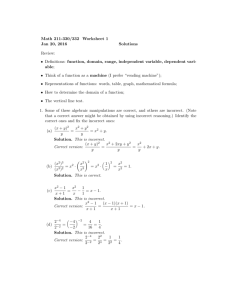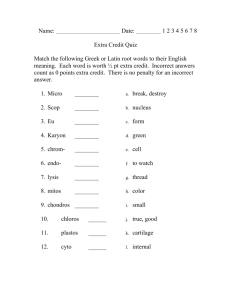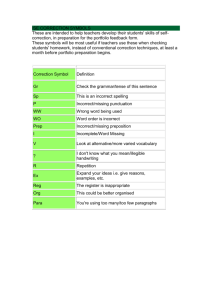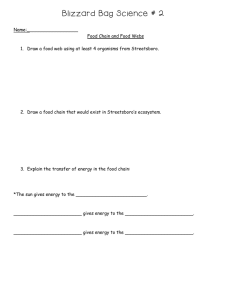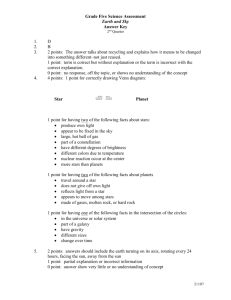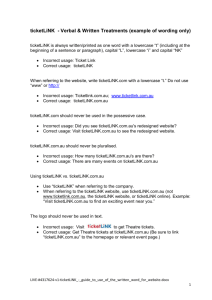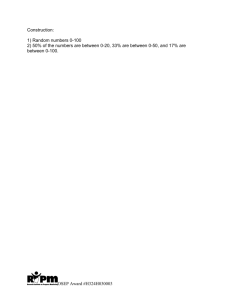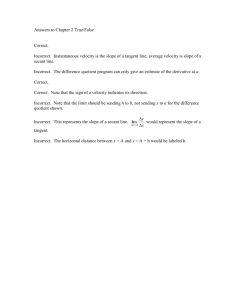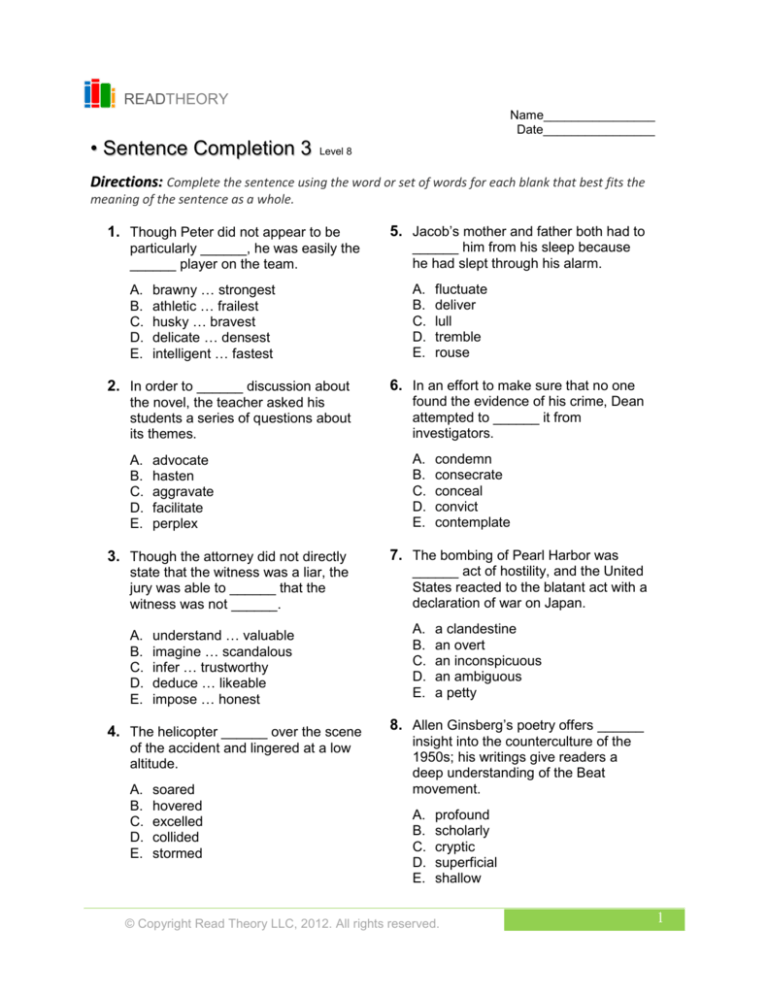
READTHEORY
Name________________
Date________________
• Sentence Completion 3
Level 8
Directions: Complete the sentence using the word or set of words for each blank that best fits the
meaning of the sentence as a whole.
1. Though Peter did not appear to be
particularly ______, he was easily the
______ player on the team.
A.
B.
C.
D.
E.
brawny … strongest
athletic … frailest
husky … bravest
delicate … densest
intelligent … fastest
2. In order to ______ discussion about
5. Jacob’s mother and father both had to
______ him from his sleep because
he had slept through his alarm.
A.
B.
C.
D.
E.
fluctuate
deliver
lull
tremble
rouse
6. In an effort to make sure that no one
the novel, the teacher asked his
students a series of questions about
its themes.
found the evidence of his crime, Dean
attempted to ______ it from
investigators.
A.
B.
C.
D.
E.
A.
B.
C.
D.
E.
advocate
hasten
aggravate
facilitate
perplex
3. Though the attorney did not directly
state that the witness was a liar, the
jury was able to ______ that the
witness was not ______.
A.
B.
C.
D.
E.
understand … valuable
imagine … scandalous
infer … trustworthy
deduce … likeable
impose … honest
4. The helicopter ______ over the scene
of the accident and lingered at a low
altitude.
A.
B.
C.
D.
E.
soared
hovered
excelled
collided
stormed
condemn
consecrate
conceal
convict
contemplate
7. The bombing of Pearl Harbor was
______ act of hostility, and the United
States reacted to the blatant act with a
declaration of war on Japan.
A.
B.
C.
D.
E.
a clandestine
an overt
an inconspicuous
an ambiguous
a petty
8. Allen Ginsberg’s poetry offers ______
insight into the counterculture of the
1950s; his writings give readers a
deep understanding of the Beat
movement.
A.
B.
C.
D.
E.
profound
scholarly
cryptic
superficial
shallow
© Copyright Read Theory LLC, 2012. All rights reserved.
1
Answers and Explanations
1) A
The main clue in this question is the word “though,” which sets up an opposite relationship between how Peter “did not appear
to be particularly” and what he actually was. The missing words describe what he did not appear to be and what he actually
was, so they must be synonyms in order to maintain the opposite relationship. Brawny means strong and muscular, while
strongest means having the most power and ability to move heavy objects. These words have similar meanings, so choice (A)
is correct.
(B) is incorrect because it does not provide a pair of words with similar meanings. Athletic means strong and fit, while frailest
means most weak and delicate. These words are opposites of each other.
(C) is incorrect because it does not provide a pair of words with similar meanings. Husky means strong or hefty, while bravest
means most courageous. These words have no clear relationship, since being strong is not the same as being courageous.
(D) is incorrect because it does not provide a pair of words with similar meanings. Delicate means fragile or easily broken,
while densest means most compacted. These words have no clear relationship.
(E) is incorrect because it does not provide a pair of words with similar meanings. Intelligent means smart, while fastest means
most fast. These words have no clear relationship.
2) D
The main clue in this question is the phrase “the teacher asked his students a series of questions.” This describes what the
teacher did “in order to” have an effect on the class’s “discussion about the novel.” By asking specific questions, the teacher
probably started or encouraged an ongoing discussion, so the missing word must mean encourage or start. Because facilitate
means to make a process easier, choice (D) is correct.
(A) is incorrect because advocate means to defend or support. Nothing in the prompt implies that the teacher needed to defend
the discussion of the novel. The discussion does not appear to have taken place under any threats or attacks.
(B) is incorrect because hasten means to speed up. Nothing in the prompt implies that the teacher needed to make the
discussion happen faster. There are no clues in the prompt that refer to speed or time.
(C) is incorrect because aggravate means to make worse or intensify. Nothing in the prompt implies that the teacher’s
questions made the discussion worse.
(E) is incorrect because perplex means to confuse. Nothing in the prompt implies that the teacher’s questions made the
discussion more confusing.
3) C
The main clue in this question is the word “though,” which indicates a negative or opposite relationship between the two parts
of the sentence. This means that the clause containing the missing words describes something unexpected, given that the “the
attorney did not directly state that the witness was a liar.” If the jury still figured out that the witness was a liar, this would be the
opposite of what is expected. Therefore, the first missing word must describe the jury’s actions or conclusions, while the
second missing word must mean honest, since it is modified by the “not” that precedes it. Because infer means to deduce
something from evidence rather than explicit statements, while trustworthy means reliable or honest, choice (C) is correct.
(A) is incorrect because it does not set up a logical relationship. Understand means to mentally grasp or comprehend, while
valuable means of great worth. Though the jury could have implicitly understood that the “witness was a liar,” being a liar does
not make someone valueless, so this choice does not work.
(B) is incorrect because it does not set up a logical relationship. Imagine means to form a concept or mental image of
something, while scandalous means disgracefully bad. Neither word would work in context, since imagining is not the same as
deducing and scandalous is not the same as honest.
(D) is incorrect because it does not set up a logical relationship. Deduce means to derive as a conclusion from something
known or assumed, while likeable means pleasant and easy to like. Though the attorney might have deduced that the witness
was a liar, deducing is not the same as understanding a hint. Additionally, being a liar does not necessarily mean someone is
unlikeable.
(E) is incorrect because it does not set up a logical relationship. Impose means to forcibly put something in place, while honest
means truthful or sincere. Though the jury might have gathered from the attorney that “the witness was not” honest, it was not
able to force that idea upon anyone.
4) B
The main clue in this question is the word “and,” which is used to link parts of a sentence that state similar information. This
means that there is a relationship between what the helicopter did “over the scene of the accident” and the fact that it “lingered
at a low altitude.” The missing word must, therefore, describe lingering over the scene. Because hovered means remained in
one place in the air, choice (B) is correct.
© Copyright Read Theory LLC, 2012. All rights reserved.
2
(A) is incorrect because soared means flew at a great height. This is the opposite of what the prompt implies when it says the
helicopter was “at a low altitude.”
(C) is incorrect because excelled means surpassed or was superior. This word does not relate to flying in the air.
(D) is incorrect because collided means clashed, struck, or made an impact. Nothing in the prompt implies that the helicopter
crashed into anything in the air.
(E) is incorrect because stormed means moved violently or angrily. Nothing in the prompt implies that the helicopter was
moving in a violent or threatening way.
5) E
The main clue in this question is “because,” which indicates a cause-and-effect relationship between the two clauses of this
sentence. This means that “because” Jacob “had slept through his alarm,” his parents had to do something. An alarm clock
usually wakes someone up, so it follows that his parents had to wake him up. Because rouse means to wake or bring out of
sleep, choice (E) is correct.
(A) is incorrect because fluctuate means to shift uncertainly or in waves. This does not work because fluctuating is not the
same as waking.
(B) is incorrect because deliver means to turn in or hand over. This is not related to waking someone up at all.
(C) is incorrect because lull means to soothe or put to rest. This is the opposite of what Jacob’s parents were trying to do to
him.
(D) is incorrect because tremble means to shake involuntarily or shiver. This does not work because trembling is not the same
as waking.
6) C
The main clue in this question is the phrase “in an effort to make sure that no one found the evidence,” a phrase that explains
why Dean “attempted to” do something. When one wants to make sure no one finds something, he or she attempts to hide it.
The missing word must, therefore, mean hide. Because conceal means to hide or keep out of sight, choice (C) is correct.
(A) is incorrect because condemn means to express complete disapproval of something. This does not work because nothing
in the prompt implies that Dean disapproved of the evidence, as it only states that he wanted “to make sure that no one found”
it.
(B) is incorrect because consecrate means to make something sacred. This does not work because nothing in the prompt
implies that Dean made the evidence sacred, as it only states that he wanted “to make sure that no one found” it.
(D) is incorrect because convict means to declare someone guilty of a crime. “Evidence” cannot be found guilty, so this choice
does not make logical sense.
(E) is incorrect because contemplate means to think about something. This does not work because nothing in the prompt
implies that Dean thought about the evidence, as it only states that he wanted “to make sure that no one found” it.
7) B
The main clue in this question is the word “and,” which links two parts of a sentence that state similar information. This means
that the “act” mentioned in the first part of the sentence is the same as the one mentioned in the second part. Since the act is
referred to as “blatant” later in the sentence, the missing word must likewise mean blatant. Overt means blatant or done or
shown openly, so choice (B) is correct.
(A) is incorrect because clandestine means secret or surreptitious. This is the opposite of a correct choice, since clandestine is
the opposite of “blatant.”
(C) is incorrect because inconspicuous means unnoticeable. This does not work because inconspicuous is not synonymous
with “blatant.”
(D) is incorrect because ambiguous means unclear or open to multiple interpretations. This does not work because ambiguous
is not synonymous with “blatant.”
(E) is incorrect because petty means minor or insignificant. This does not work because petty is not synonymous with “blatant.”
8) A
The main clue in this question is the semicolon, which is used to link independent clauses that are logically linked. This means
that the two clauses here state similar things, so the type of “insight” Ginsberg’s poetry offers is related to the “deep
understanding” his writings give. Thus, the missing word must mean deep. Because profound means deep or intense, choice
(A) is correct.
© Copyright Read Theory LLC, 2012. All rights reserved.
3
(B) is incorrect because scholarly means pertaining to academia or study. Although Ginsberg’s poetry can be viewed in a
scholarly way, this does not set up the logical, parallel relationship to “deep” as required by the prompt’s key phrases.
(C) is incorrect because cryptic means secret, ambiguous, or mysterious. Nothing in the prompt implies that Ginsberg’s poetry
was ambiguous or mysterious.
(D) is incorrect because superficial means shallow or external. This is the opposite of the “deep understanding” described by
the prompt.
(E) is incorrect because shallow means superficial or not deep. This is the opposite of the “deep understanding” described by
the prompt.
© Copyright Read Theory LLC, 2012. All rights reserved.
4


